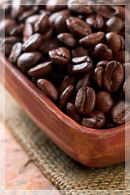 Hawaii is for more than just surfers and people working on their tans. Coffee lovers flock to The Big Island in droves every year to stock up on Kona coffee.
Hawaii is for more than just surfers and people working on their tans. Coffee lovers flock to The Big Island in droves every year to stock up on Kona coffee.
Kona coffee is the name given to coffee beans that are grown on the slopes of Mount Hualalai and Mauna Loa in the Kona districts of Hawaii’s Big Island. Just as “champagne” describes bubbly wine from the Champagne region of France, “Kona” describes coffee that comes from the Kona districts – if it isn’t grown here, it can’t be called Kona coffee.
So what makes Kona coffee so special? It’s one of those perfect storms of just the right amount of sun, rain, humidity and temperature that makes this particular area ideal for growing coffee. Because of this, pure Kona coffee is widely considered to be one of the world’s highest quality premium coffees.
Coffee has been cultivated in the Kona districts since the 19th century, but it took much of that century to turn the crop into something worth growing. Many of the coffee farms in Kona are small, family-run operations, as they have been since the early 20th century. Most farms are less than five acres in size, although the total area growing Kona coffee is over 2,200 acres.
Because Kona coffee is comparatively rare as compared to other coffees which are grown over much bigger areas, it is definitely a splurge. Many stores sell what are called Kona blends (Kona coffee blended with a Columbian or other coffee) in order to keep the prices more reasonable, but the percentage of Kona in these blends is often very low. In Hawaii, the percentage of blends must be indicated on the labels, so you’ll know just how much Kona you’re paying for. And if you decide to plunk down the big money and get the pure Kona coffee, be sure to hide your stash when guests come to visit.
If you’re a true coffee-aholic, you might want to visit during the annual Kona Coffee Cultural Festival. You’ll also find the Kona Coffee Farmer’s Association website here, and the Kona Coffee Council website here – you can learn more about the precious coffee, including where you can buy it.